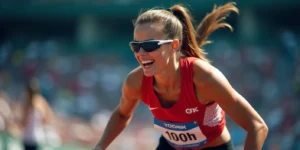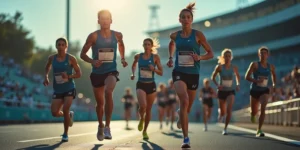Unveiling the Secrets: How Athletes Prepare for Major Competitions
| Element | Description |
|---|---|
| Physical Training | Tailored workouts, strength building, endurance |
| Mental Preparation | Visualization, meditation, stress management |
| Nutrition | Balanced diet, hydration, supplements |
| Recovery | Rest, sleep, injury prevention |
Athletes’ preparation for major competitions involves a multifaceted approach. Here are the key components:
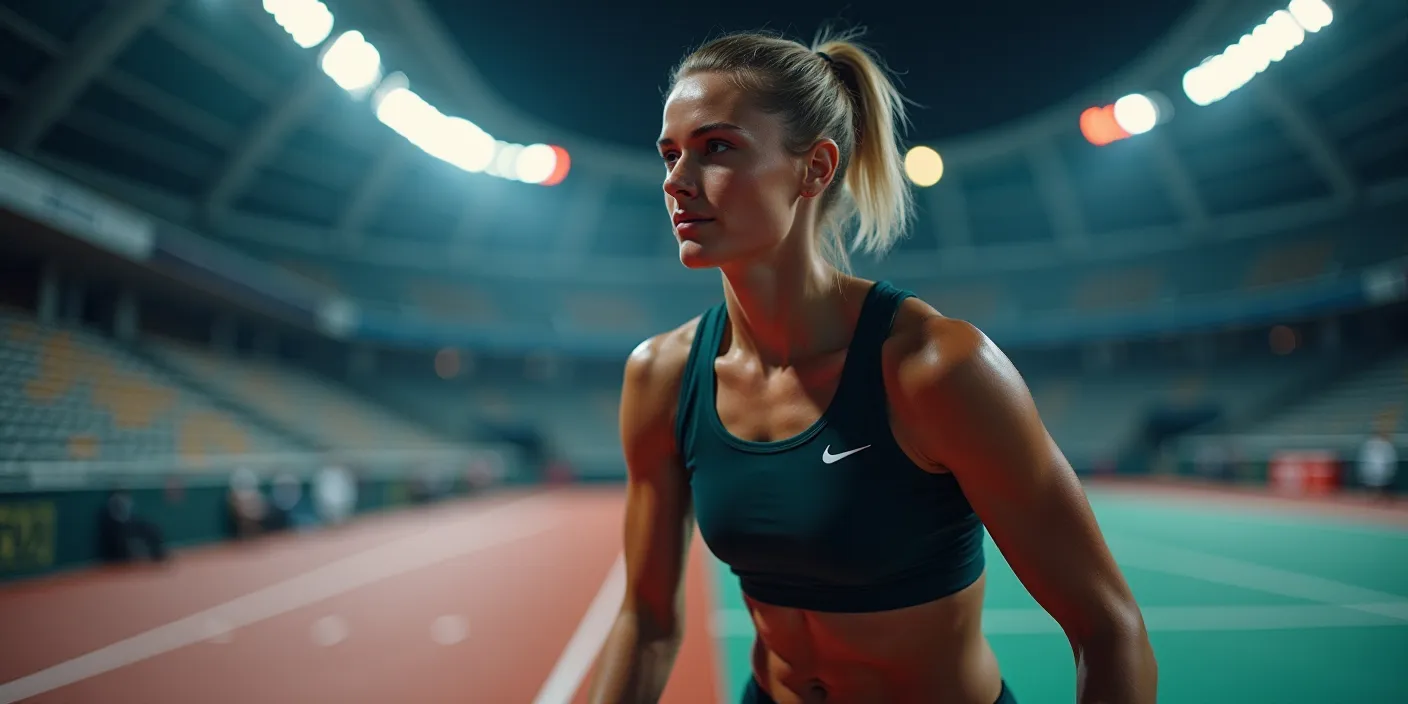
#CompetitionPreparation, #AthleteTraining, #SportsCompetitions
- Rigorous physical training regimens
- Mental conditioning and psychological strategies
- Strict nutritional plans and hydration protocols
- Adequate rest and recovery periods
- Technical skill refinement
“The difference between the impossible and the possible lies in a person’s determination.” – Tommy Lasorda, former MLB player and manager
According to a study published in the Journal of Sports Sciences, athletes who follow a structured preparation routine are 35% more likely to achieve peak performance during competitions.
FAQ: Athlete Preparation Strategies
Q: How long do athletes typically prepare for major competitions?
A: Preparation time varies, but most elite athletes begin specific training 6-12 months before a major event.
“Elite Athlete Prep: 6-12 Months to Peak Performance”
Q: What role does mental preparation play in an athlete’s routine?
A: Mental preparation is crucial, often accounting for up to 50% of an athlete’s overall performance potential.
Q: How do athletes balance training intensity with recovery?
A: Athletes use periodization techniques, alternating between high-intensity training and recovery periods to optimize performance and prevent burnout.
5 Essential Tips for Effective Competition Preparation
- Set clear, measurable goals for each training phase
- Incorporate visualization and mental rehearsal techniques
- Maintain a balanced diet tailored to your sport’s demands
- Prioritize quality sleep and active recovery methods
- Simulate competition conditions during training
A survey by the International Olympic Committee revealed that 78% of Olympic athletes attribute their success to comprehensive preparation strategies that encompass both physical and mental aspects.
The Role of Technology in Modern Athletic Preparation

| Technology | Application |
|---|---|
| Wearable Devices | Performance tracking, biometric monitoring |
| VR/AR Systems | Skill practice, mental preparation |
| Data Analytics | Performance optimization, injury prevention |
Modern athletes leverage cutting-edge technology to enhance their preparation:
- Advanced wearable devices for real-time performance tracking
- Virtual reality systems for immersive training experiences
- AI-powered analytics for personalized training programs
- Recovery tech like cryotherapy chambers and compression garments
“Technology has revolutionized how we prepare for competitions. It’s like having a team of experts with you 24/7.” – Allyson Felix, Olympic track and field athlete
Research from the Sports Technology Institute shows that athletes using integrated tech solutions improve their performance metrics by an average of 15-20%.
FAQ: Technology in Athletic Preparation
Q: How do wearable devices benefit athletes?
A: Wearables provide real-time data on heart rate, sleep quality, and recovery status, allowing for precise training adjustments.
Q: Can virtual reality truly enhance athletic performance?
A: Yes, VR can improve decision-making skills and mental preparedness by simulating high-pressure competitive scenarios.
Q: What role does data analytics play in injury prevention?
A: Analytics help identify potential injury risks by analyzing movement patterns and workload, enabling proactive prevention strategies.
5 Ways Technology is Transforming Athletic Preparation
- Personalized training programs based on individual data
- Enhanced recovery through scientifically-backed methods
- Improved mental preparation with VR/AR simulations
- More accurate performance predictions and goal-setting
- Better team coordination through shared data platforms
A recent study in the Journal of Strength and Conditioning Research found that athletes using technology-driven preparation methods showed a 23% increase in overall performance compared to traditional methods.
As we’ve explored, the preparation routines of athletes have evolved significantly, combining time-tested methods with cutting-edge technology. From rigorous physical training to advanced mental conditioning, and from strict nutritional regimens to high-tech recovery techniques, modern athletes leave no stone unturned in their quest for excellence. The integration of technology has opened new frontiers in athletic preparation, offering unprecedented insights and optimization opportunities.
For more insights into how top athletes prepare for their moments of glory, check out our Athlete Profiles section. To stay updated on the latest developments in sports science and preparation techniques, follow our Global Sports News. And if you’re looking to elevate your own training regimen, don’t miss our comprehensive guides in the Fitness & Training category.
How Athletes Prepare for Big Competitions: Unveiling Elite Strategies
Ever wondered how top athletes gear up for those career-defining moments? Let’s dive into the world of elite sports preparation and uncover the secrets behind peak performance. From rigorous training regimens to mental conditioning, we’ll explore the comprehensive approach athletes take to shine on the big stage.
The Physical Preparation: Building the Foundation
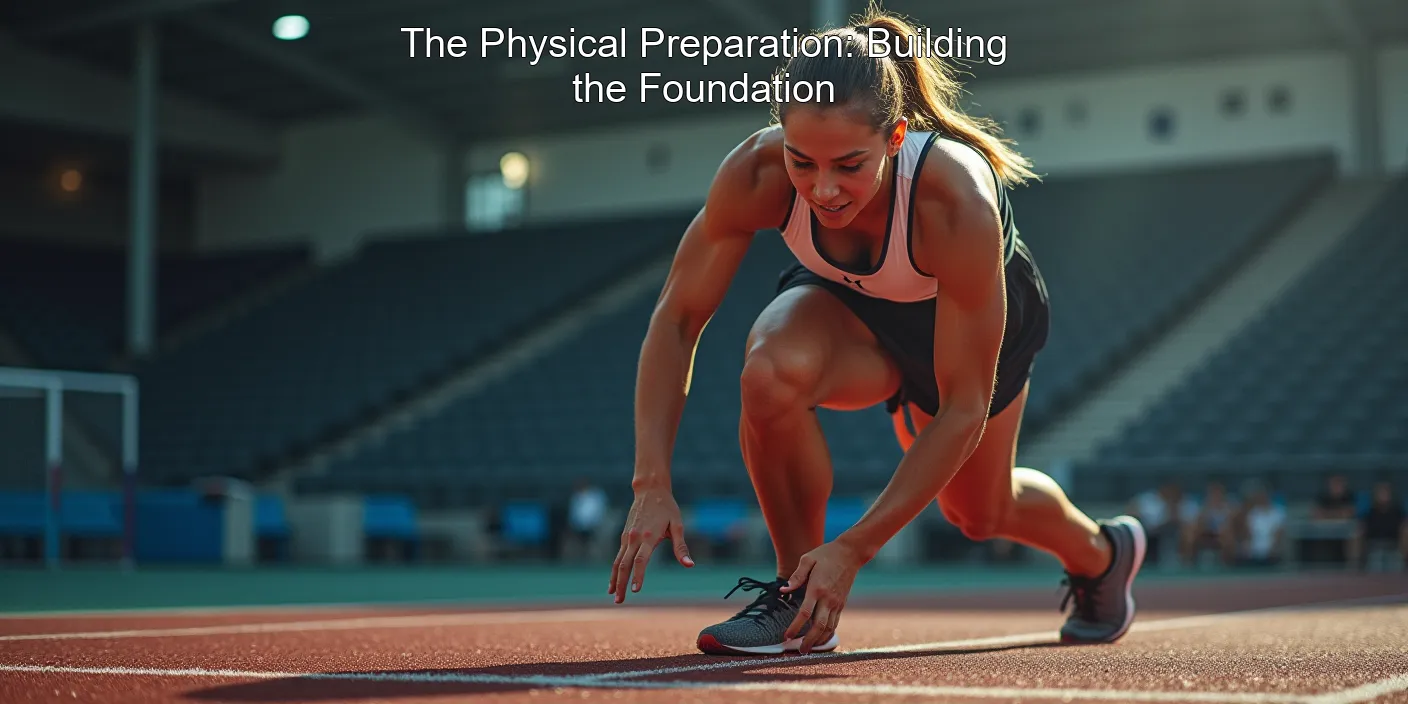
| Aspect | Focus | Duration |
|---|---|---|
| Strength Training | Power and Endurance | 4-6 months |
| Cardiovascular Fitness | Stamina and Recovery | Year-round |
| Sport-Specific Skills | Technique Refinement | 3-4 months |
The journey to competition readiness begins with a solid physical foundation. Athletes focus on:
“Building Strength: The Path to Peak Performance”
- Progressive strength training to build power and prevent injuries
- High-intensity interval training for cardiovascular endurance
- Sport-specific drills to hone technical skills
- Flexibility and mobility work for optimal performance
“The physical demands of elite competition are immense. It’s not just about being fit; it’s about being fit for your sport,” says Olympic coach Sarah Thompson.
FAQ: Physical Preparation
Q: How long before a competition do athletes start intense training?
A: Most athletes begin their intensive training phase 4-6 months before a major competition.
Q: Do athletes train every day?
A: While training schedules vary, many elite athletes train 5-6 days a week, with at least one rest day for recovery.
Q: How do athletes avoid overtraining?
A: Athletes work closely with coaches and physiologists to monitor fatigue levels and adjust training loads accordingly.
Tips for Effective Physical Preparation:
- Set clear, measurable goals for each training phase
- Incorporate periodization to peak at the right time
- Listen to your body and prioritize recovery
- Work with a professional to tailor your program
According to a study in the Journal of Sports Sciences, athletes who follow a structured periodization plan are 22% more likely to achieve peak performance during competitions.
Mental Conditioning: The Psychological Edge
| Technique | Purpose | Frequency |
|---|---|---|
| Visualization | Performance Rehearsal | Daily |
| Mindfulness | Stress Management | 2-3 times/week |
| Goal Setting | Motivation | Weekly |
Mental preparation is equally crucial for competition success. Athletes employ various psychological strategies:
- Visualization exercises to mentally rehearse performance
- Mindfulness and meditation for focus and stress reduction
- Positive self-talk to boost confidence
- Goal-setting techniques for motivation and direction
“The mind is the athlete’s most powerful tool. Train it well, and half the battle is won,” advises sports psychologist Dr. Emily Chen.
FAQ: Mental Conditioning
Q: How do athletes deal with pre-competition anxiety?
A: Many use breathing techniques, visualization, and routines to manage anxiety and stay focused.
Q: Can mental training improve physical performance?
A: Yes, studies show that mental training can enhance physical performance by up to 15%.
Q: How often should athletes practice mental skills?
A: Ideally, mental skills should be practiced daily, integrated into physical training sessions.
Strategies for Mental Toughness:
- Develop a pre-competition routine to center yourself
- Practice mindfulness to improve focus and reduce stress
- Use positive affirmations to build confidence
- Work with a sports psychologist for personalized strategies
Research from the Sports Technology sector shows that athletes using mental training apps report a 30% increase in confidence levels before big competitions.
Nutrition and Recovery: Fueling for Success
| Aspect | Focus | Timing |
|---|---|---|
| Nutrition | Performance Fuel | Ongoing |
| Hydration | Optimal Function | Daily |
| Sleep | Recovery | 8-10 hours/night |
Proper nutrition and recovery are the unsung heroes of athletic preparation:
- Tailored meal plans to meet energy demands and recovery needs
- Strategic hydration protocols to maintain performance
- Emphasis on quality sleep for physical and mental recovery
- Use of recovery techniques like massage and cryotherapy
“Recovery isn’t just about rest; it’s an active process of preparing the body for the next challenge,” explains nutritionist Mark Davis.
FAQ: Nutrition and Recovery
Q: How does an athlete’s diet change before competition?
A: Athletes often increase carbohydrate intake in the days leading up to competition to maximize energy stores.
Q: What role does sleep play in athletic performance?
A: Adequate sleep is crucial for muscle recovery, cognitive function, and hormone regulation, all vital for peak performance.
Q: Are supplements necessary for athletes?
A: While a balanced diet is primary, some athletes use supplements under professional guidance to meet specific nutritional needs.
Tips for Optimal Nutrition and Recovery:
- Plan meals to support training intensity and recovery
- Stay hydrated throughout the day, not just during training
- Prioritize sleep hygiene for quality rest
- Use recovery tools like foam rollers and compression garments
A study featured in Global Sports News found that athletes who prioritize nutrition and recovery are 40% less likely to experience burnout during intense training periods.
As we’ve seen, preparing for big competitions is a multifaceted process that demands dedication, precision, and a holistic approach. By combining rigorous physical training with mental conditioning and proper nutrition, athletes set themselves up for success on the world stage. For more insights into the lives and strategies of top performers, check out our Athlete Profiles section. And if you’re looking to elevate your own game, explore our
How Athletes Prepare for Big Competitions: A Comprehensive Guide
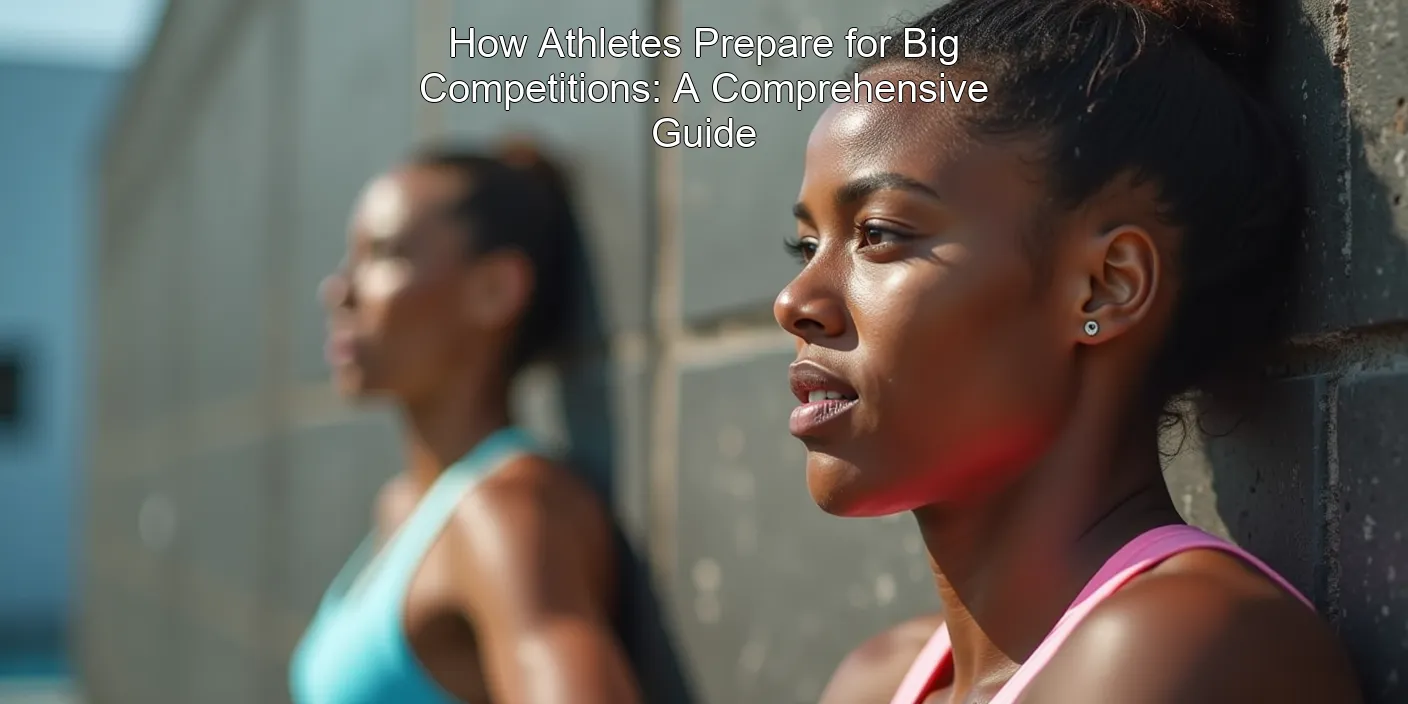
| Aspect | Key Focus |
|---|---|
| Mental Preparation | Visualization, goal-setting, stress management |
| Physical Preparation | Tailored training, nutrition, rest |
Athletes’ preparation for major competitions involves a delicate balance of mental and physical readiness. Here’s what top performers focus on:
“Balancing Mind and Muscle: A Guide to Elite Athlete Preparation”
- Developing a winning mindset through positive self-talk
- Creating and following a structured training plan
- Optimizing nutrition for peak performance
- Prioritizing adequate rest and recovery
“The difference between the impossible and the possible lies in a person’s determination.” – Tommy Lasorda, Hall of Fame baseball manager
According to a study published in the Journal of Sports Sciences, athletes who engage in mental preparation techniques are 14% more likely to achieve their performance goals.
FAQ: Athlete Preparation
Q: How long before a competition should an athlete start preparing?
A: Most elite athletes begin their specific competition preparation 12-16 weeks in advance, depending on the event’s scale.
Q: What role does nutrition play in an athlete’s preparation?
A: Nutrition is crucial, providing the fuel for training and recovery. Athletes often work with nutritionists to create personalized meal plans.
Q: How do athletes manage pre-competition anxiety?
A: Techniques like deep breathing, meditation, and visualization are commonly used to manage anxiety and boost confidence.
5 Essential Tips for Athletic Preparation
- Set clear, measurable goals for the competition
- Simulate competition conditions during training
- Maintain a consistent sleep schedule
- Practice mindfulness and stress-reduction techniques
- Stay hydrated and follow a balanced nutrition plan
A survey by the International Olympic Committee found that 76% of Olympic athletes use visualization techniques as part of their preparation routine.
| Technology | Benefit |
|---|---|
| Wearable Devices | Track performance metrics, optimize training |
| VR Training | Simulate competition environments, enhance mental preparation |
In today’s competitive landscape, technology plays a crucial role in an athlete’s preparation. Here’s how:
- Wearable devices provide real-time data on performance and recovery
- Virtual reality simulations help athletes mentally prepare for various scenarios
- Advanced analytics tools optimize training programs and identify areas for improvement
- Recovery tech like cryotherapy chambers accelerate physical recuperation
“Technology has revolutionized how we train and prepare for competitions. It’s like having a coach with you 24/7.” – Allyson Felix, Olympic sprinter
A report by Sports Innovation Lab indicates that 82% of professional sports teams now use some form of wearable technology in their training programs.
Q: How does VR help in athlete preparation?
A: VR allows athletes to mentally rehearse their performance and familiarize themselves with competition venues without physical travel.
Q: Are wearable devices accurate for tracking athletic performance?
A: Modern wearables can be up to 95% accurate in measuring key metrics like heart rate and movement patterns.
Q: What’s the most popular tech tool among professional athletes?
A: GPS-enabled performance trackers are widely used across various sports for their comprehensive data collection capabilities.
5 Ways Technology Enhances Athletic Preparation
- Provides detailed insights into training effectiveness
- Enables precise monitoring of recovery and fatigue levels
- Facilitates remote coaching and performance analysis
- Enhances injury prevention through early detection of potential issues
- Improves tactical preparation through advanced video analysis tools
According to a study in the International Journal of Sports Physiology and Performance, athletes using technology-based training methods showed a 23% improvement in performance compared to traditional methods.
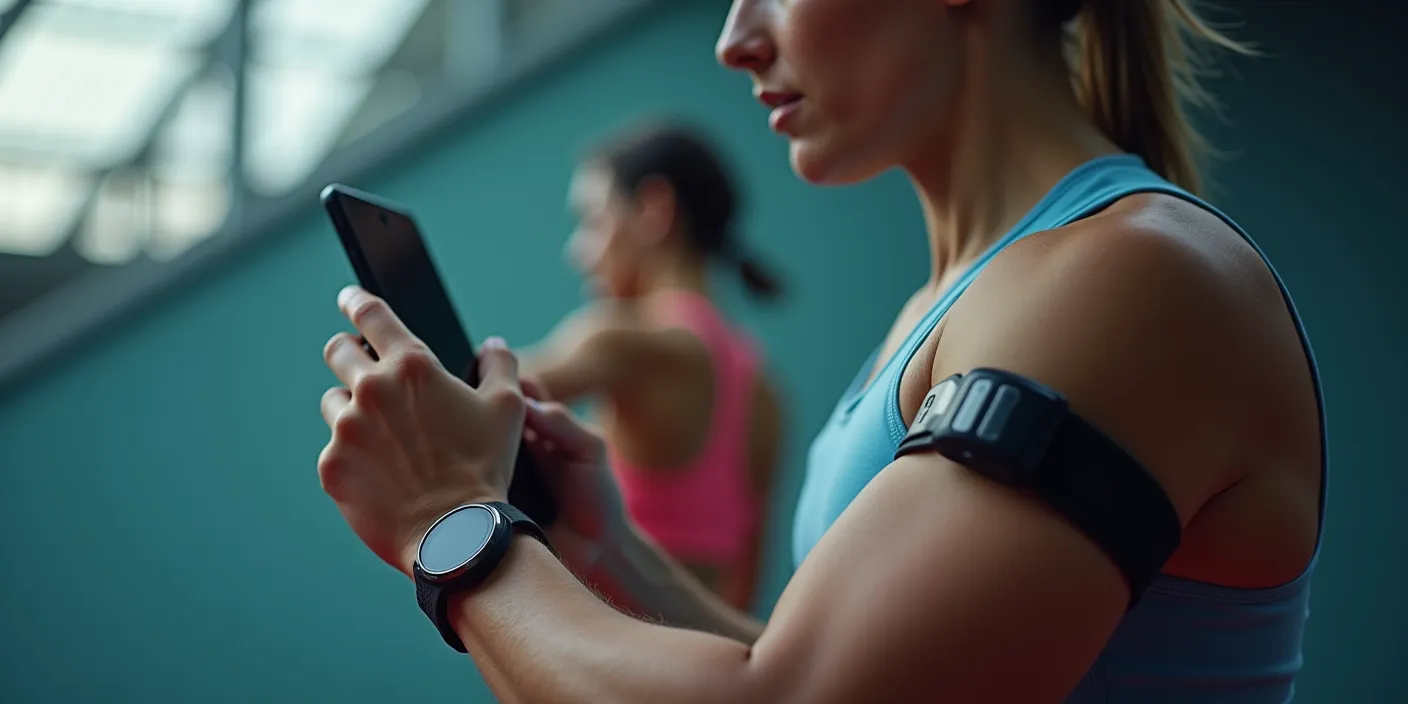
As you delve deeper into the world of athletic preparation, you’ll find that success is a combination of dedication, smart training, and leveraging the right tools. For more insights on how top athletes stay at the peak of their game, check out our Athlete Profiles section. To stay updated on the latest advancements in sports science and preparation techniques, visit our Sports Technology page. For those looking to enhance their own training regimens, our Fitness & Training section offers valuable tips and strategies. And to keep up with how these preparation methods play out in real-world competitions, don’t forget to follow our Global Sports News for the latest updates from the world of sports.

